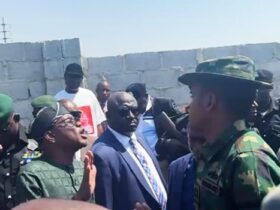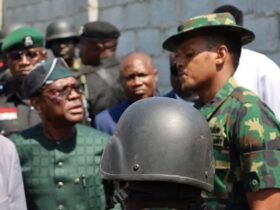A retaliatory attack in Taura Local Government Area (LGA) of Jigawa State has left a village in ashes, displacing residents and raising alarms about escalating community tensions. The violent clash, which occurred on March 9, 2025, saw 24 homes and 16 granaries destroyed by fire, leaving families homeless and livelihoods in ruins.
Here’s a detailed look at what happened, the aftermath, and the steps being taken to restore peace.
The Attack: A Night of Chaos
The violence erupted around 9:45 PM when a group of armed youths from Zangon Maje stormed the Fulani settlement of Gidan Na Ruwa. Witnesses reported that the attackers chanted war slogans as they set properties ablaze, turning the quiet village into a scene of devastation.
The attack was allegedly in retaliation for an earlier incident where two young men from Zangon Maje, Musa Hussaini (20) and Shanu Sule (26), were beaten and had their motorcycle stolen. This tit-for-tat violence highlights the fragile nature of inter-community relations in the region.
Swift Police Response: Restoring Order
In the wake of the attack, the police acted quickly to contain the situation. Officers were deployed to the scene immediately, and by the next morning, additional security reinforcements had arrived to prevent further violence.
Thanks to their efforts, calm was restored, and the situation is now under control. However, the scars of the attack remain, with displaced families struggling to pick up the pieces.
Five Suspects Arrested: Investigations Underway
Authorities have made significant progress in their investigation, arresting five suspects connected to the attack. These individuals are currently in custody and are reportedly providing crucial information that could lead to more arrests.
The arrests mark a critical step in holding perpetrators accountable and deterring future acts of violence.
Peace Talks and Security Measures
To prevent further unrest, traditional and community leaders have initiated peace talks aimed at resolving underlying tensions between the communities. These dialogues are crucial for fostering understanding and preventing future clashes.
In addition, security patrols have been intensified in the area to maintain order and reassure residents. The situation is being closely monitored to ensure stability and safety for all.
Why This Matters
This attack is a stark reminder of the dangers of retaliatory violence and the importance of addressing community grievances before they escalate. Here’s why this incident is significant:
Human Cost: Families have lost their homes and livelihoods, highlighting the devastating impact of such conflicts.
Security Concerns: The attack underscores the need for stronger security measures and conflict resolution mechanisms in rural areas.
Community Relations: It serves as a wake-up call for communities to prioritize dialogue and reconciliation over violence.
What’s Next?
As investigations continue and peace talks progress, the focus will be on rebuilding the affected village and ensuring that such incidents do not recur. Authorities are also working to address the root causes of the conflict, including disputes over resources and perceived injustices.
















Got a Questions?
Find us on Socials or Contact us and we’ll get back to you as soon as possible.